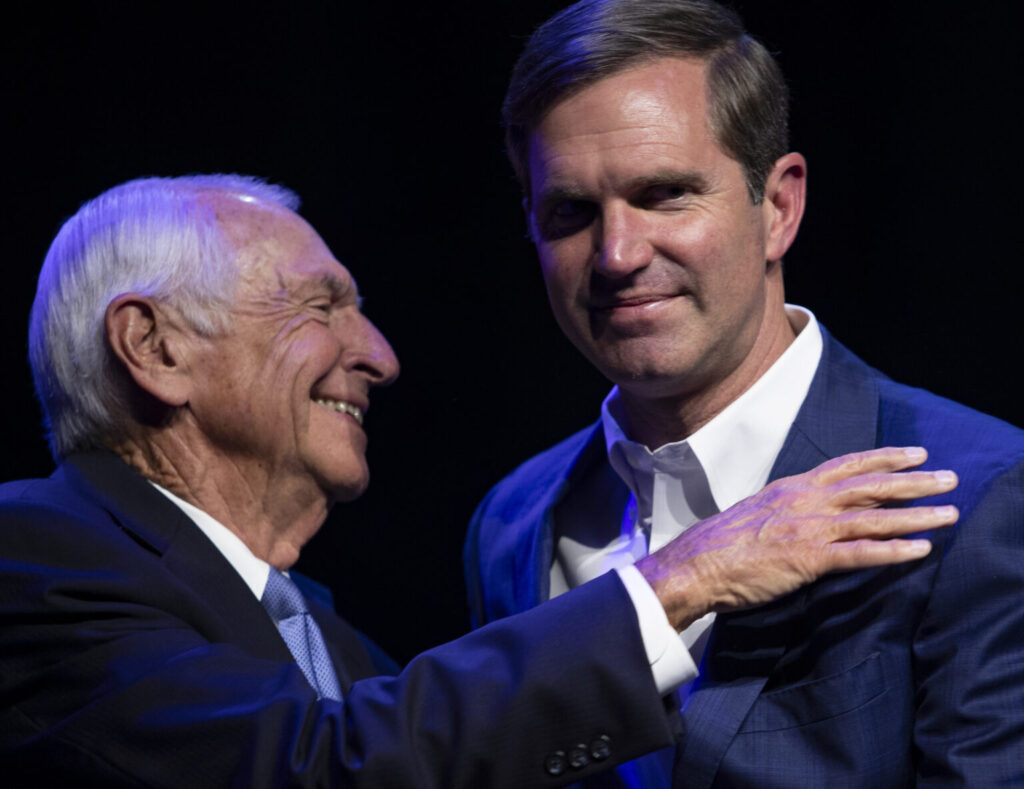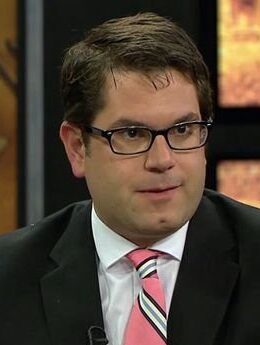FRANKFORT — Democrats’ long control of the Kentucky Capitol crumbled in the 21st century. Republicans won veto-proof supermajorities in the legislature and surpassed Democrats in registered voters.
And, yet, four of this century’s six races for governor have been won by Democrats — named Beshear.
Whether that Beshear success can be transferred to Democratic candidates for legislature and replicated in other states are questions this year’s election season will help answer.
Gov. Andy Beshear, top Democrat in a red state, is also getting attention from those who think he could be a candidate for national office.

Next month, the governor will be the keynote speaker for an Iowa Democratic Party dinner. While the Democratic National Committee moved South Carolina’s primary ahead of Iowa’s caucuses in the presidential election cycle, Iowa still plays an outsized role in nominating future presidents.
Speculation on a 2028 presidential run for Beshear began shortly after his second gubernatorial win in November. He has repeatedly ruled out running for Republican U.S. Senate Leader Mitch McConnell’s seat when it’s on the ballot in 2026.
Beshear has taken steps to elevate his national profile, such as launching a political action committee, In This Together, aimed at supporting candidates across the country. It’s raised more than $300,000.
Another clue to watch: discussion of the governor at the Democratic National Convention this August in Chicago. When asked in a recent interview with the Kentucky Lantern if he was speaking at the national convention, Beshear replied: “Don’t know.”
“If they’ve already announced the speakers, then no, but I don’t think they have,” he added.
The 2020 speakers were announced about a week before the convention.
Beshear did speak at the Kentucky Democratic Party’s Forward Together Dinner in Louisville last week, receiving a warm, energized reception. The event bore a name that is a nod to Beshear’s second inauguration theme. Beshear predicted Democrats “are going to pick up seats in our state legislature.”
While his first obligation is being governor of Kentucky, Beshear told the Lantern he is supporting in-state Democratic candidates and candidates in “some critical races across the country.” His PAC has endorsed four Democrats in other states and one candidate in a nonpartisan race, Kentucky Court of Appeals Judge Pamela Goodwine for the Kentucky Supreme Court.
“ I’m not getting involved in any race across the country. We’re only getting involved in the tough races. Some people out there might want to jump on races that are going to win anyways. If I’m going to spend the time away from Kentucky, it’s got to be to make a big difference.”
Stephen Voss, a University of Kentucky political science professor, said Beshear can’t neglect Kentucky Democrats while focusing on national ambitions. If Kentucky Democrats are in collapse, that’s not good public relations for an ascending Beshear.
“If he can succeed at helping Democrats claw back some of that legislative territory after a Republican redistricting round, it adds to his trophy case when he’s trying to portray himself as a successful crossover leader,” Voss said.

Beshear said Democrats must remain focused on “where people are” and “their biggest concerns and worries.”
“Those are not the issue of the day in D.C. that we’re all supposed to get mad about that day. It’s having a good job and being able to afford things for your families,” Beshear said. “It’s being able to afford your next doctor’s appointment, and that’s both for yourself, your kids and your parents. It’s the roads and bridges that you drive each day, public education and public safety. And when we can make progress on those, you help every family and they start seeing it.”
Kentucky Democrats now
Morgan Eaves, who became the executive director of the Kentucky Democratic Party (KDP) in February, said the party and its candidates “really identify with (Beshear’s) overall message, which is we need to make a Kentucky that works for every family, and one that’s better for every family.” Building off Beshear’s reelection with Lt. Gov. Jacqueline Coleman is Democrats’ strong suit now, Eaves said. She added that people who maybe didn’t pay attention to the party before are now, such as high school students, young Democrats and others who might have been turned off from politics in the past.

“I think a lot of southern states will tell you that their Democratic policies and beliefs are a lot different than what the GOP tries to paint us as, which are those California liberals, and we really care about those kitchen table issues. We care about what affects people every day when they wake up,” Eaves said.
Tres Watson, a former spokesperson for the Republican Party of Kentucky, said that Democrats have typically fared well in modern Kentucky governor races when their last name is Beshear.
The current governor’s father, Steve Beshear, unseated Republican incumbent Ernie Fletcher in 2007 and was reelected in 2011. Andy Beshear made his political debut in 2015, winning an election for attorney general.
“If he was Andy Smith and the 2019 election was run again, Andy Smith’s not winning that,” Watson said. “Andy Smith was never attorney general because he lost to Whitney Westerfield. Yeah, I think the last name certainly mattered.”
Watson added that the current governor also gained an advantage as an incumbent and a leader during the coronavirus pandemic, when he appeared daily in front of Kentuckians through livestreamed press conferences at the start of his first term.
Both Beshear and Eaves talked about how Democrats’ message differs from Republicans. Eaves said that her party’s focus on everyday issues was highlighted by Republicans’ legislative actions.
Kentucky Democrats have previously criticized GOP lawmakers in this year’s session for supporting a recent exemption on sales and use taxes for currency and bullion sales and House Bill 5, an omnibus tough-on-crime law. “They’re more interested in the culture war issues which don’t help people but hurt and divide people,” Eaves said. “And we found our message and we’re going to stick with it and it’s one that impacts people every day.
Voss, the political scientist, said Republican lawmakers “have overplayed their hand on the red meat conservatism” in districts with more politically-aware voters, which tend to be more affluent suburban areas. Most voters overall, he said, do not have time to pay attention to the hot topics of the day in Frankfort, often involving social wedge issues like LGBTQ+ rights, civil rights, diversity and religion.

For the most part, such wedge issues haven’t had a ton of impact at the community level, Voss said. But there is an exception — abortion — a political issue that has a widely personal impact and gives an advantage to Democrats.
“There’s some promising groundwork there, but you still need good candidates with good backing in order for them to exploit it,” Voss said.
Watson said said both political parties face internal conflicts and “are on their way to a reckoning.”
“The Democrats, their problem isn’t that much different than the Republicans,” Watson said. “It’s just here in Kentucky, the progressive ideology is just not going to win elections in large portions of the state.”
Beshear said the Democratic Party in Kentucky has “an important future.”
“I believe that when you get supermajorities regardless of the party, it can start moving a state towards extremism. And again that can happen on both ends of the political spectrum,” he said. “That it gets you away from compromise, and that could ultimately hurt policies for most people, which are somewhere in the middle. Now most people, again, care most about those everyday issues that I mentioned, and when you get supermajorities, it pushes more toward national or explosive or culture war type issues that might get people out in the next election, but don’t move anybody’s life forward.”
The road ahead
Many of the speeches at KDP’s dinner focused on its candidates who will appear on the ballot this November. Party Chairman Colmon Elridge said those in the room and others back home “have never given up on our party and never given up on Kentucky” despite hardships over the years, like the coronavirus, floods and tornadoes.
“So while it is not easy right now at times to be a Democrat, it’s not easy because we have been called in this moment not to do what is easy, but to do what is right,” he said.
Recruiting candidates has been a challenge for Democrats in recent election cycles. According to reporting from the Louisville Courier Journal, 43 House races and eight Senate races had not drawn a single Democratic candidate this year. (The House has 100 seats and the Senate 38.)
Nevertheless, Eaves told the Lantern that she “inherited a really strong party” and spoke highly of currently elected Democrats at the local and state levels.
“We recognize that while the governor is the face of the party, the party is a lot more than just the governor,” she said. “It’s about all those other other folks who are doing the work and going out there and talking to folks as well.”
The party’s future includes highlighting those serving in office now and recruiting others to serve in the future, she said. Eaves has “absolute faith that we will be in the majority one day” and will make gains over the next few election cycles.
As the Republican Party leans further right, Democrats could make gains with moderate voters, Eaves said.
“I am under no illusion that we will get to a majority tomorrow or even within the next few years,” Eaves said. “I think that the GOP played the long game, and they didn’t get discouraged. And I tell people every day around the state, they’re only in the game because they decided not to quit. And we can’t do that either.”
Kentucky Democrats “need to be reasonable in their ambitions,” Voss said. New leaders within the party need to build credibility with voters before jumping into elections. Beshear’s success came from building a brand over time, starting with his father’s success.
Voss added that climbing the political ladder is a slow process, but the national identities of being a Democrat or a Republican could change again within the next 20 years.
“Kentucky went from a Democratic-dominated state in the ’90s to a Republican-dominated state pretty soon after that — within less than a generation,” Voss said. “And if the politics of the country change again, we could move again just as quickly.”
Eaves said she views Kentucky as more of a “purple state” than a red one, particularly with Beshear at the helm.
“I think Kentucky is always in play, particularly at the state level. I’m not going to argue that we’re in play at the federal level and certainly, maybe not in the presidential race,” she said. “But those state legislative and those state constitutional races, I think they are just as attainable — for Democrats as they are (for) Republicans. It’s just about putting in the work and investing in the infrastructure to get it done.”
This article is republished under a Creative Commons license from Kentucky Lantern, which is part of States Newsroom, a network of news bureaus supported by grants and a coalition of donors as a 501c(3) public charity. Kentucky Lantern maintains editorial independence. Contact Editor Jamie Lucke for questions: info@kentuckylantern.com. Follow Kentucky Lantern on Facebook and Twitter.
McKenna Horsley covers state politics for the Kentucky Lantern. She previously worked for newspapers in Huntington, West Virginia, and Frankfort, Kentucky. She is from northeastern Kentucky.






